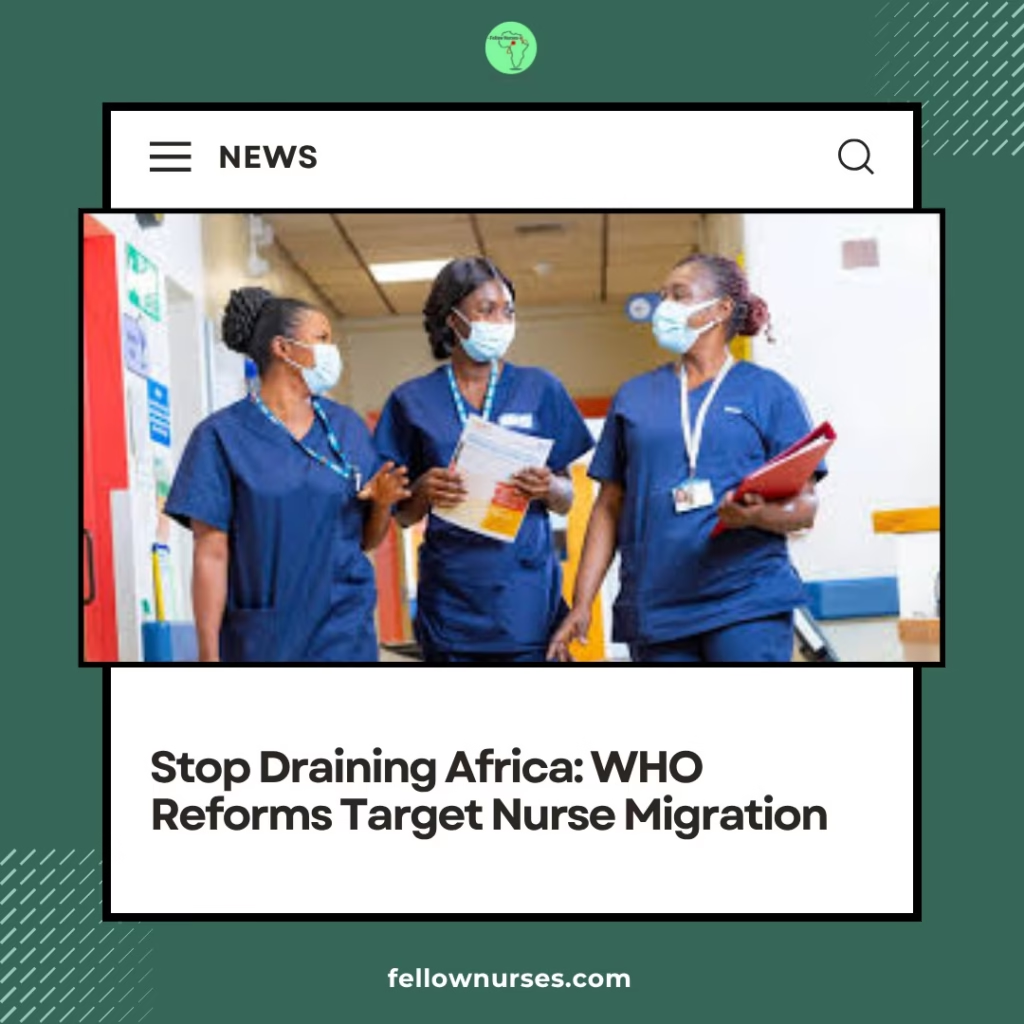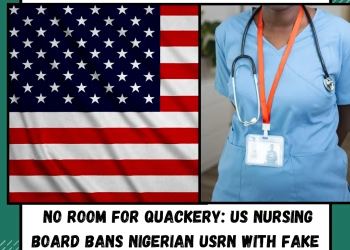Fellow Nurses Africa, 05 August, 2025.

Stop Draining Africa: WHO Reforms Target Nurse Migration
Africa’s healthcare systems are losing their lifeblood as nurses and doctors depart for better opportunities in wealthier nations. The World Health Organization (WHO) Regional Office for Africa is taking decisive action, convening urgent consultations to reform the Global Code of Practice on the International Recruitment of Health Personnel. Echoing the International Council of Nurses (ICN) President’s powerful call for rich countries to “give back” after reaping billions from African talent, and reinforced by the post-COVID WHO Safeguard List, Africa is demanding an end to the unfair drain of its health workforce. This is a clarion call for justice, equity, and a sustainable future for African healthcare.
The Crisis: Africa’s Health Workforce Under Strain
From Nigeria’s rural clinics to Kenya’s urban hospitals, the migration of healthcare professionals is creating a crisis. WHO projects a need for 6.1 million additional health workers by 2030 to meet Africa’s growing health demands. Yet, aggressive recruitment by wealthier nations is leaving behind:
- Empty wards and understaffed emergency units
- Overworked nurses, with some in Nigeria managing 35 patients per shift
- Burnout and emotional toll on remaining staff
- Compromised patient safety
In a compelling July 2025 exposé, Fellow Nurses Africa highlighted the stark inequity: rich countries save billions by hiring Africa’s trained nurses, while African health systems bear the cost of training and loss. The ICN President labeled this practice “unfair,” urging that “if they take, rich countries must give back” through investments in African training and infrastructure. Discover the true cost of this global recruitment in Fellow Nurses Africa’s in-depth report.
“We are not just revising a code. We are fighting for the future of healthcare in Africa.”
— Dr. James Avoka Asamani, WHO Africa Workforce Lead
WHO’s Response: A Push for Ethical Reform
On July 30, 2025, the WHO Regional Office for Africa convened 47 African Member States in a virtual consultation to overhaul the 2010 Global Code of Practice, which has proven ineffective against unethical recruitment. Dr. Adelheid Werimo Onyango, WHO Africa Health Systems Director, called for a “living, actionable instrument” to safeguard African health systems.
African leaders outlined three critical demands:
- Enforceable Guidelines: Binding commitments to curb poaching from vulnerable systems.
- Regional Realities: Addressing Africa’s unique challenges, including workforce shortages and fragile infrastructure.
- Retention Investments: Aligning with the Africa Health Workforce Investment Charter, prioritizing fair wages, improved working conditions, and training opportunities.
The consultation resonated with raw stories: a Kenyan official reported 40% of rural nurses migrating within a year, while Nigerian delegates described the heartbreak of understaffed facilities, with one nurse lamenting “endless shifts and dwindling hope.”
Post-COVID Protections: The WHO Safeguard List
In response to post-COVID shortages, the WHO established a Safeguard List, identifying countries like Nigeria where direct recruitment should be restricted to protect fragile health systems. Yet, weak enforcement allows rich countries to continue targeting African nurses, deepening the crisis. The ongoing reforms aim to strengthen these protections, ensuring global recruitment respects Africa’s needs.
“This is not just about migration—it’s about justice, equity, and survival.”
— Fellow Nurses Africa
Nurses at the Heart of the Fight
Nurses are the cornerstone of African healthcare, yet they face wrenching choices: remain in under-resourced systems or pursue better prospects abroad. The ICN President’s demand for reciprocity—rich countries investing in Africa’s training programs—strikes a chord. These WHO reforms offer nurses a platform to shape global policy.
African nurses are called to advocate for:
- Competitive wages to rival international offers
- Safer workplaces to alleviate burnout
- Career development to make staying in Africa viable
For a deeper look at the human and economic toll of nurse migration, read Fellow Nurses Africa’s earlier publication, “Billions Saved, Nurses Lost: The True Cost of International Nursing Recruitment”.
The Path Forward: Africa Leads the Charge
Input from the July 30 consultation will inform recommendations for the WHO’s 156th Executive Board meeting in 2026. Africa is no longer a passive observer—it’s steering the global conversation on ethical recruitment. As Dr. Asamani declared, this is a battle for the future of African healthcare.
Nurses, this is your moment. Will you stay in Africa? What changes would anchor you here? Share your story with Fellow Nurses Africa and join the movement to halt the drain.
Take Action Now
- Advocate: Join nursing unions to champion retention policies.
- Amplify: Share your migration experiences on X to spotlight the crisis.
- Support: Endorse the Africa Health Workforce Investment Charter.
“Every nurse who leaves creates a ripple effect. Let’s transform this crisis into opportunity.”
— Fellow Nurses Africa
Fellow Nurses Africa is the independent voice of African nursing, we educate, inform and support the nursing profession.










